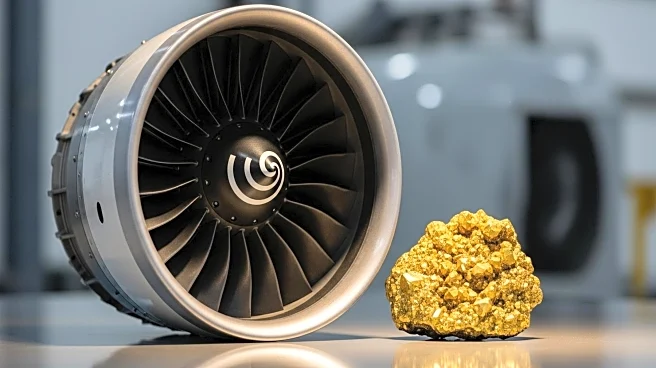What's Happening?
President Trump has announced potential export controls on Boeing aircraft parts as a countermeasure to China's restrictions on rare earth mineral exports. This development comes as China imposes limits on these critical materials, which are essential for various industries, including technology and defense. During a press briefing at the White House, President Trump highlighted the significance of Boeing parts, noting that Chinese airlines have substantial orders for Boeing jets, with 222 planes currently on order and 1,855 in service. The majority of these are Boeing's 737 single-aisle jets, which are widely used in commercial aviation. The proposed export controls are part of a broader strategy to address the economic impact of China's export restrictions.
Why It's Important?
The potential export controls on Boeing parts could have significant implications for the aviation industry and U.S.-China trade relations. Boeing, a major U.S. aerospace company, relies heavily on international sales, with China being a key market. Restricting parts exports could disrupt the supply chain for Chinese airlines, potentially affecting their operations and future aircraft acquisitions. This move also underscores the escalating trade tensions between the U.S. and China, particularly in sectors reliant on rare earth minerals. The aerospace industry, which is vital to the U.S. economy, could face challenges if these export controls are implemented, impacting jobs and economic growth.
What's Next?
If the U.S. proceeds with export controls on Boeing parts, it could lead to retaliatory measures from China, further straining bilateral relations. Stakeholders in the aviation industry, including airlines and manufacturers, will likely engage in discussions to mitigate potential disruptions. Additionally, policymakers may explore alternative strategies to secure rare earth supplies and reduce dependency on Chinese exports. The situation may prompt broader negotiations between the U.S. and China to address trade imbalances and ensure stable supply chains for critical materials.
Beyond the Headlines
The proposed export controls highlight the strategic importance of rare earth minerals in global trade and national security. As countries vie for control over these resources, ethical and environmental considerations regarding their extraction and use may gain prominence. The situation could also accelerate efforts to develop domestic sources of rare earths or invest in recycling technologies to reduce reliance on imports.










